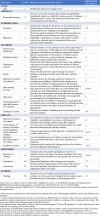"Gut-brain axis": Review of the role of the probiotics in anxiety and depressive disorders
- PMID: 32910544
- PMCID: PMC7559609
- DOI: 10.1002/brb3.1803
"Gut-brain axis": Review of the role of the probiotics in anxiety and depressive disorders
Abstract
Background: Depressive disorders are the leading cause of disability worldwide and together with anxiety contribute to a very high burden of disease. Therefore, improving their treatment is a significant medical research target: The role of probiotics is a topic of great interest for the current research in this field.
Objectives: To explore the current literature about the impact of probiotics on anxious and depressive symptoms.
Methods: Scoping review following the PRISMA guidelines.
Results: The selection process yielded 23 studies. Probiotics positively affected depressive symptomatology and anxiety symptoms according to 53.83% and 43.75% of the selected studies, respectively. Among the studies assessing inflammatory biomarkers, 58.31% found they were decreased after administration of probiotics.
Conclusion: The results emerging from the existing literature about probiotic supplementation for depression treatment are encouraging, but further research is needed considering the shortage of clinical trials on this topic and the heterogeneity of the samples analyzed.
Keywords: anxiety; depression; gut-brain axis; inflammation; probiotics.
© 2020 The Authors. Brain and Behavior published by Wiley Periodicals LLC.
Conflict of interest statement
The authors declare that they have no competing interests.
Figures
References
-
- Ait‐Belgnaoui, A. , Durand, H. , Cartier, C. , Chaumaz, G. , Eutamene, H. , Ferrier, L. , … Theodorou, V. (2012). Prevention of gut leakiness by a probiotic treatment leads to attenuated HPA response to an acute psychological stress in rats. Psychoneuroendocrinology, 37, 1885–1895. 10.1016/j.psyneuen.2012.03.024 - DOI - PubMed
-
- Akkasheh, G. , Kashani‐Poor, Z. , Tajabadi‐Ebrahimi, M. , Jafari, P. , Akbari, H. , Taghizadeh, M. , … Esmaillzadeh, A. (2016). Clinical and metabolic response to probiotic administration in patients with major depressive disorder: A randomized, double‐blind, placebo‐controlled trial. Nutrition, 32(3), 315–320. 10.1016/j.nut.2015.09.003 - DOI - PubMed
-
- Arseneault‐Breard, J. , Rondeau, I. , Gilbert, K. , Girard, S.‐A. , Tompkins, T. A. , Godbout, R. , & Rousseau, G. (2012). Combination of Lactobacillus helveticus R0052 and Bifidobacterium longum R0175 reduces post‐myocardial infarction depression symptoms and restores intestinal permeability in a rat model. The British Journal of Nutrition, 107(12), 1793–1799. 10.1017/S0007114511005137 - DOI - PubMed
-
- Bandelow, B. , Baldwin, D. , Abelli, M. , Altamura, C. , Dell'Osso, B. , Domschke, K. , … Riederer, P. (2016). Biological markers for anxiety disorders, OCD and PTSD ‐ a consensus statement. Part I: Neuroimaging and genetics. The World Journal of Biological Psychiatry, 17(5), 321–365. 10.1080/15622975.2016.1181783 - DOI - PubMed
-
- Begtrup, L. M. , De Muckadell, O. B. S. , Kjeldsen, J. , Christensen, R. D. , & Jarbol, D. E. (2013). Long‐term treatment with probiotics in primary care patients with irritable bowel syndrome‐A randomised, double‐blind, placebo controlled trial. Scandinavian Journal of Gastroenterology, 48(10), 1127–1135. 10.3109/00365521.2013.825314 - DOI - PubMed
Publication types
MeSH terms
LinkOut - more resources
Full Text Sources



